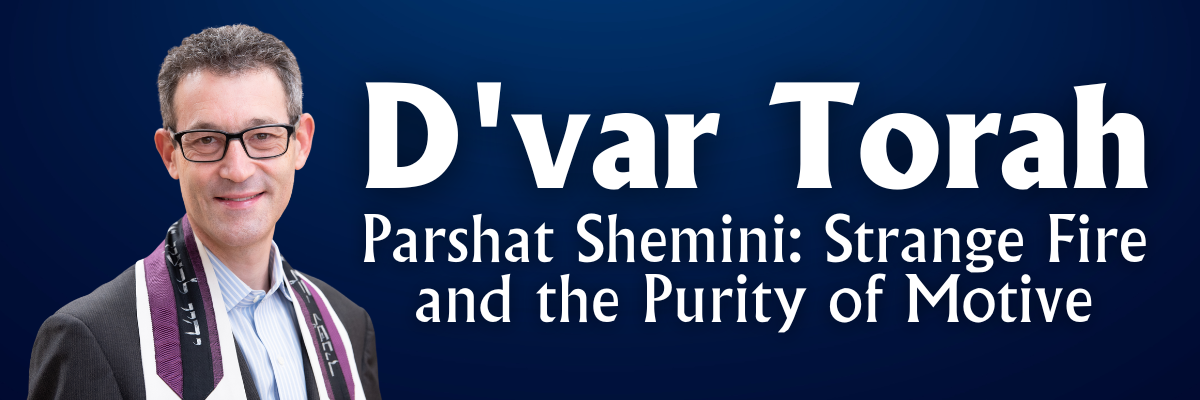Parshat Shemini: Strange Fire and the Purity of Motive
04/13/2023 10:11:20 AM
Rabbi Jeff Saxe
| Author | |
| Date Added | |
| Automatically create summary | |
| Summary |

Greetings to all, and I hope your Passover celebrations were happy and rewarding and you’re enjoying the beginning of spring.
It’s funny that of all Jewish holidays, Passover is the one we do at home. Far from being easy for the layperson, the Seder is complicated and confusing even for a professional – is this the handwashing with or without the blessing? Do we drink the wine this time, or just pick it up and put it down? Luckily, the goal is not perfection, but to reflect on the themes of the day and enjoy good food and company. In the end, if we didn’t do the Seder perfectly, nobody gets struck by lightning.
Not so in Parshat Shemini, this week’s Torah portion. The priests, led by their father Aaron, have just performed the first sacrifice at the new Tabernacle. After following all of God’s instructions exactly, and after a moment of nervous suspense, they are dramatically rewarded by God’s fire consuming the burnt offering. The people break into jubilation. Then Nadav and Avihu, two of Aaron’s sons, pick up their fire pans and offer incense again. The Torah calls their offering one of “strange fire, which God had not enjoined upon them.” This time, the fire that comes from God takes the lives of these two young men.
The story of the strange fire, or Eish Zarah, is a troubling one that has inspired much commentary from the rabbis. It is unclear from the text what it is that these priests did wrong. One theory is that they had been drinking, because just afterwards, God admonishes the priests never to enter the sanctuary intoxicated. Another theory is that it was not their place to make an offering at that time. They carelessly took it upon themselves. From our modern perspective, the punishment Nadav and Avihu receive is cruel and mystifying. Some Jews rebelled against the teaching that access to God should be restricted to those with authority and expertise. Post-Temple, rabbinic Judaism reflects that view: priests are no more, and you don’t need to be a rabbi or cantor to do almost any ritual.
Still, a plain understanding of the story carries a thought-provoking message for us. In this reading, Nadav and Avihu are attracted by God’s power, and they jump up and try to bask in it. They may not even realize it, but they are motivated more by their own glory than by the real purpose of this new Tabernacle. Their punishment is not about the exactness of a ritual or the permission to perform it, but rather about whether they are in it for themselves or their community. The people are given a powerful force. However, they are warned to be careful: are we using our power for the good of all? The words Moses offers Aaron for the death of his sons are,
“Through those near to Me (God) I show myself holy, and gain glory before all the people.”
What is important is that the focus be the divine calling, or the larger purpose – not our own gratification. In the Ethics of The Fathers, Rabbi Yossi says all of our deeds should be l’sheim shamayim, for the sake of heaven. In everything we do, we should strive to do it for the right reasons. This teaching, like the story of the strange fire, reminds us to reflect on our motives, in our daily lives, to make sure our actions are coming from the right place.
Wishing you a spring of new and positive beginnings,
Rabbi Jeff Saxe
Tue, October 14 2025
22 Tishrei 5786
Join Our Mailing List
Privacy Settings | Privacy Policy | Member Terms
©2025 All rights reserved. Find out more about ShulCloud
